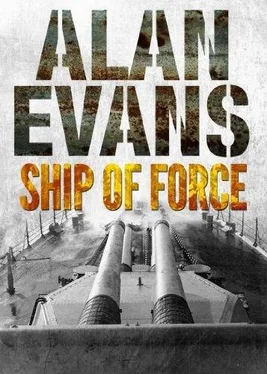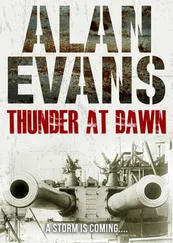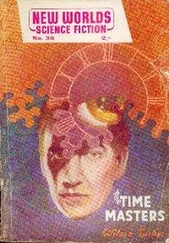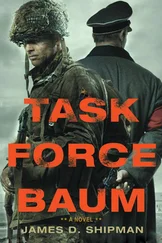“Reply: ‘Open fire when ready.’ Signal the launches to make smoke.”
All straightforward so far, no hitches. This was a drill and they had done it before, knew what to expect. But they had not fired a round yet and this operation would follow a deadly dangerous, predictable course. A bombarding ship was always at risk, at a disadvantage against shore batteries if they were at all efficient and the batteries at Ostende were. Timing could mean the difference between life and death and it lay in his hands.
The RE8 buzzed away towards the coast with its escort climbing above it and the launches began making smoke with the smoke-making machines they carried. Dense clouds of it, mixed black and white poured out and rolled slowly downwind. It would hide them and the monitor from the shore batteries and was mixed black and white because when white smoke only had been used the black cordite of the monitor’s guns had marked their position for the shore batteries. He thought that but for the smoke it might have been a deceptively peaceful scene, the monitor lying at anchor, the tug chugging up and down and Sparrow patrolling at an easy twelve knots. But the monitor’s guns were trained on the shore, barrels at high elevation pointing skywards. Any moment now…
Marshall Marmont fired, a single gun thundering out, the flame jetting orange and smoke spurting black from the recoiling muzzle. The massive fifteen-inch shell, half a ton of it, went howling away into the clouds, soaring to nearly nine thousand feet high before starting on its downward path. It would fall in about forty-five seconds and some fifteen hundred yards short of Ostende. The spotting aircraft should be able to spot it there and order a correction.
Sparrow ’s patrolling course had taken her clear of the smokescreen and before she turned he saw the Harry Tate twisting and turning off Ostende and all around it the cotton-wool puffs in the sky that were the bursting of anti-aircraft shells. He saw something else and lifted his glasses. Was that a balloon rising over Ostende, the silver skin of it catching what leaden light there was? He was sure of it and knew what it meant. Just as the Harry Tate spotted for the monitor, so the observer in the basket swinging below the balloon served the shore batteries. Smith and his flotilla would be under fire soon. It was time for Garrick to cross his fingers. He found his own were crossed and shoved his hands in his pockets. Superstitious nonsense. But he kept them crossed.
Sanders said, “Balloon’s gone up, sir.”
Smith grunted. “That it has. Go round Sub, and tell ’em all to keep their eyes skinned for U-boats. I know they’ve been told. Tell ’em again.”
“Aye, aye, sir.”
A man could become bored staring at an empty sea and be distracted by the action elsewhere.
Smith was not bored. This was like walking out along a plank.
Marshall Marmont fired again.
So the observer in the Harry Tate had spotted the fall of the first shell and ordered a correction. Or he had not seen it and ordered a repeat. Sparrow patrolled her beat and each time she turned he had a view of the coast and the aircraft. Every two minutes or so Marshall Marmont fired a single, ranging round as the observer ordered corrections to bring the gun on for line and extended the range towards the target. Smith did not envy the observer his job, bucketing about in the cramped cockpit of the RE8 as it twisted and turned off Ostende. The German anti-aircraft gunners were banging away at him and he had to peer down over the side of the cockpit with the engine’s clamour deafening him and the oil spraying back, watch for the shell’s burst and then send his correction to the monitor.
The regular thumping slam ! of the ranging gun marked the passage of time like the slow tick of a great clock. As Sparrow tacked up and down on her patrol and while he still concentrated on his command a part of Smith’s mind worried at the mystery thrust upon him. “ Schwertträger … Hinterrücks anfallen .” ‘Sword-bearer’ — a code name, obviously, but for what? And ‘stab in the back’. That could mean the Atlantic shipping…There was another mystery. The patrol over De Haan that Morris had spoken of. Now he could see it.
He was jerked totally back to the present as the monitor fired a salvo, both guns. So she had ranged on to the target, the dockyard installations or a ship in the basin, or the lock gates. He saw the shock-wave send a shudder out across the sea.
The RE8 still circled and soared, though now the anti-aircraft guns had ceased firing. Instead there was a dog-fight going on involving half-a-dozen aircraft, the escorting Sopwiths and a flight of Albatros fighters swooping and climbing, diving, curling away. But he noticed one oddity. The single German aircraft to the north over De Haan had been joined by two others but they only patrolled, made no attempt to join the dog-fight. Strange, but –
“Port ten!” Dunbar ordered.
“Port ten, sir!” Gow answered.
Sparrow came steadily around.
“Meet her. Steer two-four-oh.”
“Two-four-oh, sir!”
Sparrow steadied on the southward leg of her patrol. Buckley had stood a trick at the helm but now Gow, the coxswain, was again at the wheel. Or over it. His big body curled over it like a question mark, head bent above the compass card, long arms gripping the spokes. Gow was a good cox’n.
Sparrow rode well enough in this quiet sea but the sky was darkening. In bad weather she would be a pig. These ships, this ship, kept the sea right through the gales and foul weather of winter, though they were not really fit for the task. They demanded, therefore, a special breed of seaman. Smith stared out at Marshall Marmont , a ship seen through the haze of the smoke from her guns’ firing and beyond her the rolling smoke of the screen. Flame, smoke and slam ! as she fired. The barrels of the guns, the turret and her foredeck were stained black from the smoke of her firing.
His flotilla. One elderly, frail game chicken and one pot-bellied lame duck. They were his ships. But the men? Trist regarded both ships and their crews as problems. But Smith already had an affection for Sparrow and Garrick spoke well of Marshall Marmont’s crew. Garrick would always defend his crew but he was no fool and he was honest with Smith. So something could be, would be made of this flotilla…
He was still thinking about it when there was a whistling roar as a German salvo passed overhead and a second later burst in the sea in four massive spouts of upflung water. Well out to sea, well over, but that was a ranging salvo. The next would be shorter and these looked to be big shells, maybe eleven-inch, and they would be from the Tirpitz battery sited just south of Ostende. It was a well-hidden, well-protected battery. Over the last three years it had been shelled from the sea, from guns behind the lines at Nieuport, and the Royal Flying Corps had bombed it — but the Tirpitz battery was still intact and firing as well as ever.
The next salvo would be shorter — Smith called to the signalman, “Signal to Commodore: ‘Under fire from Tirpitz battery. Continuing bombardment.’”
The signalman ripped the sheet from the pad and slapped it in the hand of the bridge messenger who slid down the ladder to the iron deck and ran aft to the wireless shack between the first and second funnels.
Smith took two restless paces across the bridge and returned. He wished the Sopwith Triplanes could have shot down that balloon but they had their hands full with the Albatros V-strutters and now Smith could see another flight of the German fighters climbing. A commander in this kind of operation had to consider the safety of his ships and the lives of his men. At the same time the operation had to be carried out, the attack pressed home. Hazarding ships and men could bring a charge of negligence, while failure to press home the attack might be regarded as cowardice; your senior officer might think you had cut and run too soon. It depended on his point of view and in this case it was Trist’s point of view. Smith remembered Dunbar’s outburst: ‘We’re going to be put up like targets to be shot at!’ He shrugged uneasily. That was nonsense; this was just one more operation. But whatever Smith did, he had to be right . It was all a question of timing.
Читать дальше












